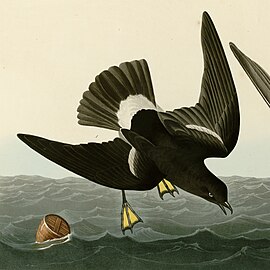The Song of the Stormy Petrel

"The Song of the Stormy Petrel" (Russian: Песня о Буревестнике) is a short piece of revolutionary literature written by the Russian writer Maxim Gorky in 1901. Written in a variation of unrhymed trochaic tetrameter with occasional Pyrrhic substitutions, it is considered poetry.
History

In 1901, no one could criticise the Tsar directly and hope to escape unhappy fate. The language calling for revolution is coded—the proud stormy petrel, unafraid of the storm (that is, revolution), as all other animals cower.
Maxim Gorky wrote "The Song of the Storm Petrel" in March 1901 in Nizhny Novgorod. It was first published in the Zhizn magazine in April 1901.[1] Gorky was arrested for publishing "The Song", but released shortly thereafter.
The poem was later referred to as "the battle anthem of the revolution",[2] and the epithet Burevestnik Revolyutsii (The Storm Petrel of the Revolution) soon became attached to Gorky himself.[1] According to Nadezhda Krupskaya, "The Song" became one of Lenin's favorite works by Gorky.[1]
In honor of the poem, and of Maxim Gorky himself, various things in the Soviet Union—and, in particular, in its Gorky Oblast—became named "Burevestnik" (Storm Petrel), including a national sports club, a series of hydrofoil boats,[3] an air base in the Kuril Islands, a labor-union resort by the Gorky Reservoir, and a Moscow-Nizhny Novgorod express train. The storm petrel imagery appeared on monuments and memorial coins dedicated to Maxim Gorky.
The bird species in the song
As a poet, Gorky would not pay too much attention to precisely identifying the birds species appearing in his "Song". The Russian word burevestnik (modified by appropriate adjectives) is applied to a number of species in the families Procellariidae (many of whose species are known in English as petrels) and Pelecanoididae (diving-petrels). This Russian word is not, however, used to name the species properly known in English as storm-petrel, or any other species from its family (the Hydrobatidae). However, since the Russian burevestnik can be literally parsed by the speaker as 'the announcer of the storm', it was only appropriate for most translators into English to translate the title of the poem as "Stormy Petrel" (or, more rarely, "Storm Petrel").
Other avian characters of the poem are generic seagulls, loons (also known as "divers"; Russian, гагара), and a penguin. While North Hemisphere loons and south hemisphere penguins are not likely to meet in the wild, their joint participation in the poem is a legitimate example of a poetic license. Or the penguin might refer to the extinct Great Auk, genus Pinguinus, once known commonly as "penguins".
Translations
The Song was translated to many languages (and to almost all officially-recognized languages of Russia). Some examples: German,[4] Japanese,[5] Hebrew.[6]
The text of the poem
The text in original Russian and English translation follows (the English translation is GFDL; note on translation on the discussion page).
|
Над седой равниной моря ветер тучи собирает. Между тучами и морем гордо реет Буревестник, чёрной молнии подобный. То крылом волны касаясь, то стрелой взмывая к тучам, он кричит, и — тучи слышат радость в смелом крике птицы. В этом крике — жажда бури! Силу гнева, пламя страсти и уверенность в победе слышат тучи в этом крике. Чайки стонут перед бурей, — стонут, мечутся над морем и на дно его готовы спрятать ужас свой пред бурей. И гагары тоже стонут, — им, гагарам, недоступно наслажденье битвой жизни: гром ударов их пугает. Глупый пингвин робко прячет тело жирное в утёсах... Только гордый Буревестник реет смело и свободно над седым от пены морем! Всё мрачней и ниже тучи опускаются над морем, и поют, и рвутся волны к высоте навстречу грому. Гром грохочет. В пене гнева стонут волны, с ветром споря. Вот охватывает ветер стаи волн объятьем крепким и бросает их с размаху в дикой злобе на утёсы, разбивая в пыль и брызги изумрудные громады. Буревестник с криком реет, чёрной молнии подобный, как стрела пронзает тучи, пену волн крылом срывает. Вот он носится, как демон, — гордый, чёрный демон бури, — и смеётся, и рыдает... Он над тучами смеётся, он от радости рыдает! В гневе грома, — чуткий демон, — он давно усталость слышит, он уверен, что не скроют тучи солнца, — нет, не скроют! Ветер воет... Гром грохочет... Синим пламенем пылают стаи туч над бездной моря. Море ловит стрелы молний и в своей пучине гасит. Точно огненные змеи, вьются в море, исчезая, отраженья этих молний. — Буря! Скоро грянет буря! Это смелый Буревестник гордо реет между молний над ревущим гневно морем; то кричит пророк победы: — Пусть сильнее грянет буря!.. |
|
References
- ^ a b c "Maxim Gorky: The Song of the Stormy Petrel" (in Russian).
- ^ "A Legend Exhumed", a review of Dan Levin's book Stormy Petrel: The Life and Work of Maxim Gorky. TIME. June 25, 1965.
- ^ Russian River Ships
- ^ http://theaderado.npage.de/gorki_lied_vom_sturmvogel_15602293.html
- ^ http://ja.wikipedia.org/wiki/海燕の歌#.E8.A9.A9.E3.81.AE.E5.86.85.E5.AE.B9
- ^ http://saginatus.livejournal.com/115769.html
